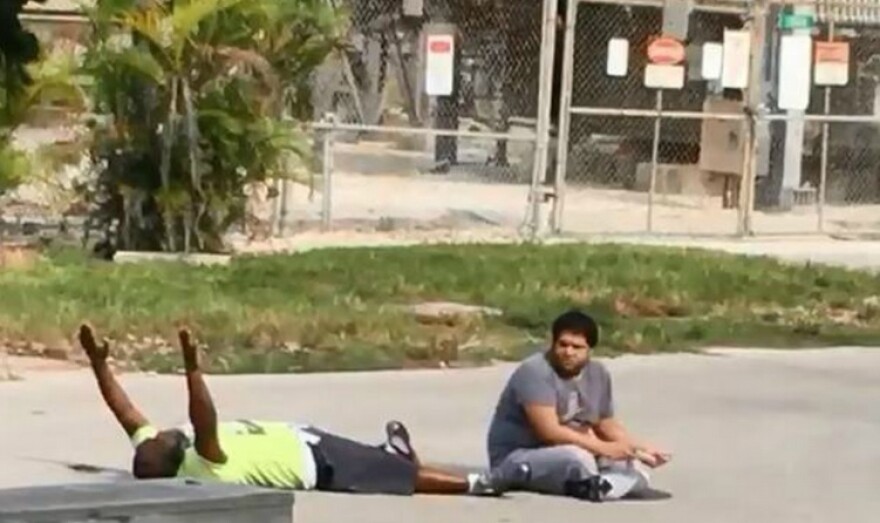A bill requiring autism awareness training for law enforcement officers is starting to move in both chambers of the Florida Legislature. It comes after a high profile incident that occurred in South Florida last year involving a black man, an autistic man, and law enforcement.
Back in July, the shooting of Charles Kinsey—an unarmed black man in Miami—made national headlines. Why did it receive such attention?
Kinsey, a therapist at a group home, was with his autistic patient, Arnaldo Rios. Video shows Kinsey lying on the ground with his hands upraised, and talking to law officers. They were responding to calls of a suicide attempt with a gun. Even after Kinsey tries to calm Rios, one officer ends up shooting Kinsey—who still had his hands up.
“I still got my hands of the air,” said Kinsey, speaking to WSVN. “And, I said, ‘you know I just got shot.’ And, I asked him,’ sir, why did you shoot me?’ And, he said, ‘I don’t know.’”
Before he was shot, Kinsey said he wasn’t just worried for himself, he was also concerned about Rios.
“I was really worried…more worried about him than myself because I’m thinking, as long as I’ve got my hands up they’re not going to shoot me,” Kinsey added. “This is what I’m thinking. Wow, was I wrong!”
At the time, the police union representing the officer who shot Kinsey said officers believed Rios was holding a gun, although it was really a toy truck. So, the shot was meant for the 23-year-old autistic man.
But, Matthew Dietz—the lawyer for Rios and his family—said that’s wrong.
“‘We didn’t mean to shoot the African American guy. We meant to shoot the man with the disability’ is the height of ableism,” said Dietz. “It makes a person with a disability’s life worth nothing. It makes them not even a human. After they knew that he had autism, what did they do? They threw him on the ground. He’s sensitive to touch. He’s sensitive to noise. He didn’t know what was happening. They kept him a in a police car for three to four hours. There’s no excuse.”
Almost a week after the shooting, Rios’ mother and sister—Miriam and Gladys Soto—said Rios was still traumatized by the incident.
“He’s still traumatized,” said Miriam, translating for her mother. “He’s having night terrors. He’s not sleeping. He’s not eating. He’s not the same anymore. He’s still wearing the same clothes from the accident with Charles’ blood...”
And, now, more than six months later, Lobbyist Susan Goldstein says Rios’ condition is pretty much the same.
“It was very traumatic to this poor child, and he is a child, even though he looks like an adult,” said Goldstein. “He was cognitively probably around four-five years old. And, he has been in turmoil since.”
As the mother of an autistic daughter, she says it’s important law enforcement be trained to recognize the condition.
“Just the fact that police would know what the characteristics of autism and the symptoms—the rocking, the hand flapping…these children with autism do not wear physically their disabilities as many other developmental disabilities are recognizable immediately,” added Goldstein.
That’s why she supports a bill by Rep. Evan Jenne (D-Dania Beach) and Sen. Perry Thurston (D-Fort Lauderdale).
Thurston says his bill will have a positive effect on the way law enforcement interact with many Florida children. The CDC estimates 1 in 68 kids are diagnosed with autism.
“And, what this bill does is it requires the Department of Law Enforcement to establish a constant employment training component relating to autism spectrum disorder,” said Thurston. “This constant training will count toward the continued employment of 40 hours with each department and would have specific instructions on how law enforcement responds to citizens with autism spectrum disorder for officers to be able to identify the symptoms and characteristics.”
Both the House and Senate bills recently unanimously passed their first committees.
For more news updates, follow Sascha Cordner on Twitter: @SaschaCordner.






